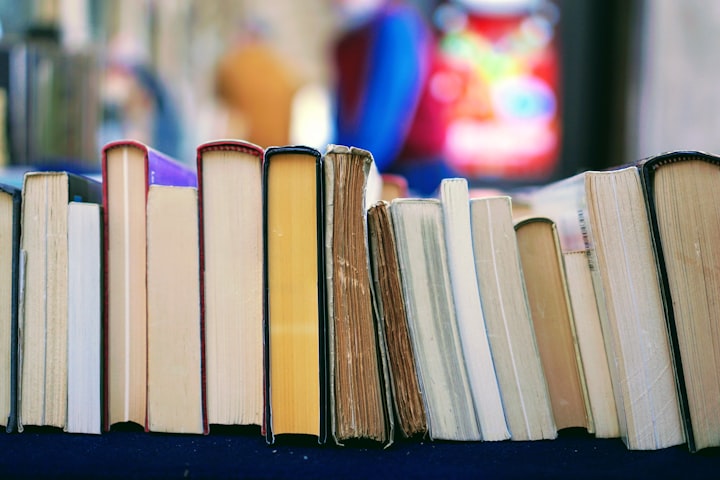Can I Ask You a Question?
What makes you love a book? Or a book series?

What makes you love a book? Or a book series?
When you find one that resonates with you—why? Why that particular book? What about this story or that story that makes you want to shout it from the rooftops, share it online, review it, badger your friends to read it?
The easy answer, and the one I'm rejecting, is that a book just clicks with you. It entertains and intrigues you because how you're wired. That's all totally true...but it's also too easy. Because if that's the answer, then there really isn't an answer as to why some book series are beloved by so many different readers. Harry Potter, after all, is beloved by millions of people...and the chances are good that they all love it for different reasons. I happen to love it because of its spectacular worldbuilding and fun characters. You might love it because you just really like wizards and witches.
(One thing we can agree on: JK Rowling is a tool)

And it has nothing to do with genre. I happen to love scifi, which would make sense, because I write the stuff. But I don't like all scifi books. There are some I have literally thrown across the room. This is where books differ from music and movies, in a way I can't put my finger on. If you like a particular hip-hop track, there's an excellent chance you'll like a large percentage of the other hip-hop tracks out there. If you enjoyed SpiderMan Homecoming, then hey, the Marvel movies are probably a good fit for you.
But if you happen to love my book The Girl Who Could Move Sh*t With Her Mind (and you should, because it's awesome), it's not always easy to recommend other books with an absolute guarantee that you'll love them. Sure, I could tell you to go check out David Wong, who writes similarly batshit-fucking-crazy action scifi thrillers with tongue jammed firmly into one cheek...but it's not a slam dunk. That's not a slur on Wong. That's just the nature of the beast.
I think it might have something to do with how books are made. By definition, they come from a single mind (or pair of minds, if two authors have teamed up). While they've obviously been worked on by editors and artists, they are particular to a writer in a way that movies and music aren't. Think about it: with some exceptions, musicians generally don't work alone; they'll rely on guests, producers, and other musicians to help out. Movies, of course, are almost never made solo. There's always a massive team involved.
I think this is what gives books that X factor. That doesn't mean books are superior to movies and music, but I think it goes someway to explaining why it's hard to pin down a consistent set of reasons why Book X is loved and Book Y is not.
Now at this point, you probably think I don't have many other places to go with question. And you'd be right. Fortunately, other people can do it for me.

See, I actually posed this question in my weekly newsletter. I didn't expect responses, because mostly, people sign up to get a fun article in their inbox every Thursday. Except: I didn't just get responses. I got RESPONSES.
Within a day, my inbox was full of essay-length replies to this question, going into huge detail about why the writer loved a particular book or series. I would have been delighted with one-line responses, but here I was with many deep, thoughtful, considered replies to my question.
To say my gast was flabbered would be an understatement. I was genuinely amazed. It was like opening the fridge to get a Coke only to find that the whole thing is actually full of Coke cans and so is your kitchen and you also own stock in Coca Cola and have their logo tattooed on your butt. But in a good way.
I want to share a few of my favourite responses below—they make for some thought-provoking reading. A few kind folks let me share their answers (with permission, and lightly edited). You can find them below.
I don't want your face tattooed on my butt, though. That would be weird for both of us.

Helen S.
I am going to disagree with what you said, I don't think you love a book because it comes from a single mind. I have read so many books that I loved but then gone to read more by that author and I am like, "what is this shit?". Just because you read one book by that author doesn't mean you will like their other work. So it can't be that?
For me it's about timing. The when and where of reading a particular story, whether you need a cheesy romance or a chaotic sci-fi hero, it's about finding it at the right time. I know that I could read the same book a few months or even weeks later and it wouldn't have the same impact. I read The Night Circus at a time when I needed an escape. I got totally absorbed in the mystery and magic of the story and absolutely loved it. But I will NEVER read it again. I know I will never be able to recreate that moment in my life with that story.
I admit that it doesn't work with every single book you read. But I think it does with the ones you love. Think of one of your favourite books. Now tell me when and where you first read it. You remember right? You remember the when, the where and how it made you feel. That was the right story for you at the right time.
John F.
You have asked an interesting and difficult question – and not one I’m sure I can answer with concision. But some of the things that make me love a book are:
1. Is it well-written? I don’t mean grammatically correct, I mean that it’s story is not interrupted in my mind by awkward expressions, or wrongly used words or idioms. My teeth grate if you say “coming down the pipe” instead of “pike.”
2. Would I like to be one or more of the characters. Are they doing or saying things I would like to say or do? In Catch 22 (a book I have read six or seven times), I absolutely am Yossarian, the main character.
3. Do the characters or situations arouse feelings in me? Robert Parker’s “Spenser” series are full of action, as are the books of Michael Connelly (Harry Bosch), Lawrence Block (Matthew Scudder) and James Lee Burke (Dave Robichaux), but they also deal empathically with issues of human necessity – they have moral centres: “Everybody counts or nobody counts.”
4. Do they have an underlying theme of salvation and redemption? All the best stories do, and I’m not saying that from a religious point of view. I’m an absolute atheist and yet when someone is saved from situations in their life, or redeems themselves through ‘courageous’ action, I get goosebumps.
5. Is the story unpredictable, but not in a hackneyed way? Agatha Christie was hackneyed; Philip Kerr is not.
6. Is the story charming, even childlike in it’s worldview, while pointing to a more complex world? The best children’s books do this: Mouse and His Son, Mistress Masham’s Repose, Freddy and the Ignormus [sic] – three of my favourite kid’s stories, all of which I re-read recently.
7. Do I wish the hell I had written that? So many books that are witty, fast-paced, intellectually challenging, suspenseful: Fool, by Christopher Moore (the best telling of the King Lear story ever and that includes Shaxpur’s version); The Sisters Brothers; A Gentleman in Moscow; Fifteen Dogs; Tracer; so, so many.
James P.
Two aspects play the most obvious role for me: skill of the writer and the characters in the book -> their personalities, how they react to given situations and perhaps most importantly, can I identify in any way with them. Surprisingly enough, what they're doing isn't at the top of the list as long as it doesn't affect how much I can or cannot line my own brainwaves up with their own.
...If a writer doesn't have any mojo to speak of - and here I'm just talking about basic English skills, editing chops, etc. - the game is already over. I spent years doing technical/production writing and knew that if I!!! made a mistake, I could blow up the place. That sticks with you. So if someone is screwing the pooch with homonym switches or other basic grammar mistakes, my brain is already subtracting stars. I just can't take it and will literally read with a frown on my face. I don't even demand that the writer add in all kinds of neato 4-syllable synonyms - though I get all squishy if they do - but goddamn, you've got to have a basic mastery of the language or have a friend / spouse / editor that knows their business to make sure it seems like you do.
Lexi
You really made me think about this “why do you like a book” question and I think The Frost Files series is actually a really good example for me personally. Action/sci-fi is definitely not my normal genre - I’m more of a romcom and thriller kind of gal - but I was first drawn to The Girl That Could Move Shit With Her Mind...because it said shit in the title. At that point that was all I needed. Ooo fun fact, I bought the second book before even reading the first one because I was COMMITTED but also just had a really good feeling about it. But it was when I actually started reading that I knew I found something special. I think it’s because this story FEELS real. Sci-fi usually has a way of just feeling very made-up because it’s typically centered in a fantasy world but that’s not what we have here. I can go to LA. I can go see the places that Teagan talks about. I feel like I could walk down the sidewalk and run into Teagan, Annie, Reggie, anybody because they feel like real people because you have portrayed them as such.
So I guess I just love a book that feels real. It’s not even about just relating to the story or the characters, it’s about feeling like it could really happen.
*
This article comes directly from my weekly newsletter, Sh*t Just Got Interesting. Want to read stories like it a week before anyone else? Sign up here. And you get a free audiobook too, which is nice.
About the Creator
Jackson Ford
Author (he/him). I write The Frost Files. Sometimes Rob Boffard. Always unfuckwittable. Major potty mouth. A SH*TLOAD OF CRAZY POWERS out now!






Comments
There are no comments for this story
Be the first to respond and start the conversation.